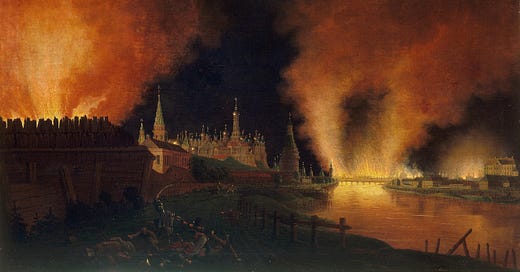Phantoms and Reflections
War and Peace Week 38: Book 3, Part 3, Chapter 33 – Book 4, Part 1, Chapter 4
This is a long post and is best viewed online here. To get these updates in your inbox, subscribe to Footnotes and Tangents and turn on notifications for War and Peace 2024. This post is now available to download as a podcast: search for War and Peace 2024 wherever you get your podcasts.
Are you enjoying our slow read? I need your help.
Soon, I will be letting people know about the 2025 slow read of War and Peace. Have you enjoyed the readalong? If so, I’d love to hear from you. What were your expectations at the start of the year? What has surprised you? And what impact has the slow read had on your life and reading? If you are happy for me to share your thoughts with future readers, I have started a chat thread where you can write testimonials, or you can send me a DM or email. Your words will be enormously important for readers trying to decide whether to take the plunge and read War and Peace in 2025. Thank you so much for taking the time.
Welcome to Week 38 of War and Peace 2024
This week, we have read Book 3, Part 3, Chapter 33 – Book 4, Part 1, Chapter 4.
Everything you need for this read-along and book group can be found on the main War and Peace page of Footnotes and Tangents. There you will find:
The reading schedule with links to daily chat threads for each chapter.
Weekly updates like this one.
Keep reading with a 7-day free trial
Subscribe to Footnotes and Tangents to keep reading this post and get 7 days of free access to the full post archives.



